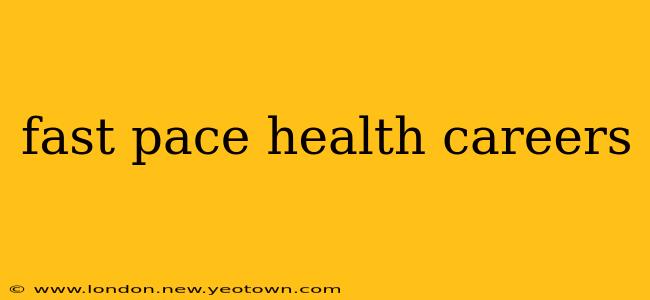The world of healthcare is vast, offering a spectrum of careers, from the meticulous pace of research to the frenetic energy of emergency medicine. If you thrive under pressure, crave immediate impact, and are drawn to the adrenaline rush of saving lives, then a fast-paced health career might be your perfect calling. This isn't just about long hours; it's about the unique satisfaction of making a tangible difference in people's lives, often in a matter of seconds.
Let's explore some of the most exciting and demanding roles that define the fast-paced side of healthcare.
What are some fast-paced careers in healthcare?
This question often tops the list for those seeking high-stakes, high-reward professions. The answer is surprisingly diverse, ranging from hands-on patient care to crucial behind-the-scenes support. Think:
-
Emergency Medical Technician (EMT) / Paramedic: These are the frontline responders, the first to arrive at accident scenes or medical emergencies. Their quick thinking and decisive actions can mean the difference between life and death. Every call is different, every patient unique, ensuring no two days are ever the same.
-
Registered Nurse (RN) in Emergency Departments or Intensive Care Units (ICUs): Emergency rooms and ICUs are the epicenters of fast-paced healthcare. RNs in these settings must be adaptable, resourceful, and able to handle multiple critical situations simultaneously. The constant influx of patients requiring immediate attention demands peak performance under pressure.
-
Surgical Technician: Operating rooms are high-pressure environments demanding precision and speed. Surgical technicians are integral to the surgical team, preparing instruments, assisting surgeons, and ensuring a sterile environment – all while maintaining a calm demeanor amid the urgency of the procedure.
-
Critical Care Nurse: These nurses specialize in the care of critically ill patients, often managing life support systems and reacting swiftly to changing patient conditions. Their knowledge, skill, and ability to stay calm under extreme pressure are crucial.
-
Respiratory Therapist: These professionals manage patients with respiratory problems, often in critical care settings. They are skilled in operating ventilators and other life-support equipment, requiring quick responses to changes in patient oxygenation and breathing patterns.
What are the pros and cons of fast-paced healthcare jobs?
Choosing a career path requires careful consideration. Let's weigh the advantages and disadvantages of fast-paced roles:
Pros:
- Constant stimulation and challenge: No two days are alike, keeping the work engaging and preventing boredom.
- Immediate impact: You see the direct results of your efforts, providing a strong sense of accomplishment.
- Opportunities for professional growth: The constant learning and adaptation required lead to rapid skill development.
- High demand and job security: Skilled professionals in these areas are always in high demand.
- Strong sense of purpose: Contributing to saving lives and improving people's health offers immense personal satisfaction.
Cons:
- High stress and burnout potential: The demanding nature of these roles can lead to significant stress and burnout if not managed properly.
- Irregular hours and shift work: Many fast-paced roles require working nights, weekends, and holidays.
- Exposure to traumatic events: Witnessing accidents, injuries, and suffering is a reality in these professions.
- Emotional toll: Dealing with critically ill or injured patients can be emotionally challenging.
- Physical demands: The work can be physically taxing, requiring strength, stamina, and quick reflexes.
What skills are needed for fast-paced health careers?
Success in these demanding environments relies on a unique blend of skills:
- Critical thinking and problem-solving: Quick, accurate decision-making is paramount.
- Adaptability and flexibility: Handling unexpected situations and changes in plans is essential.
- Communication skills: Clear and effective communication with colleagues, patients, and families is crucial.
- Teamwork and collaboration: Working effectively as part of a team is vital in fast-paced settings.
- Resilience and stress management: The ability to handle pressure and bounce back from setbacks is key.
- Physical stamina and dexterity: Many roles demand physical strength, endurance, and fine motor skills.
Are fast-paced healthcare jobs in demand?
The answer is a resounding yes. The aging population, coupled with advancements in medical technology, is driving a significant increase in demand for healthcare professionals, particularly those capable of handling high-pressure situations. This demand translates to strong job security and competitive salaries.
What education is required for a fast-paced healthcare career?
Educational requirements vary depending on the specific role. Some, like EMTs, require associate degrees or certifications. Others, such as RNs, require bachelor's degrees and extensive clinical experience. Thorough research into the specific career path is vital to understand the necessary educational requirements.
Embarking on a fast-paced healthcare career is a significant commitment, demanding both dedication and resilience. However, the rewards—the immediate impact, the constant stimulation, and the profound sense of purpose—make it a uniquely fulfilling path for those who thrive under pressure and are driven to make a real difference in the world.

